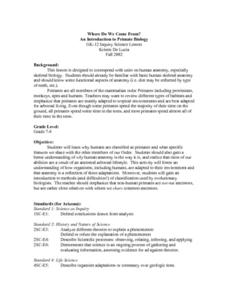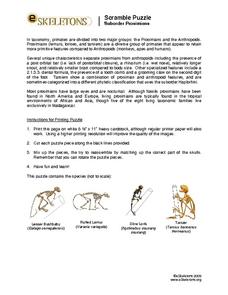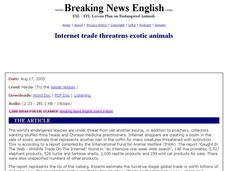Curated OER
Protect the Primates
Students make posters about saving the primates. In this primates lesson plan, students discuss primates and environmental changes and make posters with pictures about saving primates.
Curated OER
Where Do We Come From? An Introduction to Primate Biology
Seventh graders explore skeletal biology. Through a discussion and video observation, 7th graders investigate how the anatomy is adapted to the environment. Students study primates and explore their characteristics and behaviors.
Curated OER
Primate Evolution
For this evolution worksheet, students review 9 terms associated with the evolution of primates. Students place 6 terms into a crossword puzzle and 3 terms into fill in the blank statements.
Curated OER
Primate Evolution
For this primate evolution worksheet, students use an idea map showing how primates have evolved into the different groups to complete 1 true or false and 2 short answer questions.
Curated OER
Primate Evolution
In this primate evolution worksheet, students will review the structures and functions that are characteristic of primates. Students will identify the differences between Old World monkeys, New World monkeys, and prosimians. This...
Curated OER
Ape Genius
Students watch a video and discuss the research on the intelligence of apes. In this primate lesson plan, students view a NOVA video about ape intelligence. They work in groups to take notes on the observations and conclusions of...
Curated OER
The Earliest Primates
In this early primate worksheet, students will read information about the fossil evidence of the earliest primates. Students will complete 3 short answer questions based on their reading.
Curated OER
Primate Evolution
In this primate evolution learning exercise, high schoolers use a diagram showing different primate adaptations to complete 3 short answer questions comparing human traits and primate traits.
Biology Junction
Mammals
Mammals include more than 4,000 species and represent the most dominant land animals on Earth. Scholars learn about the large variety of mammals, including orders unfamiliar to most. The presentation highlights the characteristics and...
Curated OER
Classification of Intertidal Organisma
Students categorize animals. In this animal classification lesson, students group animals by their characteristics. Students break into groups and work together to classify the animals. Students fill out a graphic organizer with their...
eSkeletons
Skeleton Scramble Puzzle: Suborder Prosimians
Explore the finer details of primate skulls with these puzzles, incorporating advanced scientific analysis of two suborders- Prosimians and Anthropoidea- and one superfamily- Hominoidea. Learners read about the unique characteristics of...
Omaha Zoo
I Like to Move It
What do lemurs do best? They move! Lemurs like to jump, run, hop, and climb and it's your class's job to document seven fun lemur behaviors. The class starts by discussing why lemurs are considered primates, and then they isolate seven...
Howard Hughes Medical Institute
Human Feet Are Strange
Feet are neat! So, if you've already walked the path of examining animal footprints with your class, put them in the shoes of early humans! A well-designed lesson incorporates video, discussion, and hands-on learning to demonstrate how...
Curated OER
What's A Mammal?
Learners examine mammals understanding what a mammal is and reviewing the eleven mammal groups. In this science lesson, students play a game known as Mystery Mammal Game. Yet, first learners research about the mammal and then give...
Curated OER
Exploring Learned and Innate Behavior
Compare and contrast learned and innate behaviors between humans and primates. Your biology class members read articles and participate in discussions about the use of tools and communication methods. That's about it, you'll probably...
Curated OER
The Opposable Thumb
Students participate in an activity which helps them realize the importance of the opposable thumb through trying to live without it. The goal of this activity is for students to understand the physical importance of the opposable thumb.
Curated OER
Evolution worksheet
Looking at evolution in detail, this thorough learning exercise has complex questions requiring details and explanations of natural selection and diversity. Various examples of biological characteristics are available, and students...
Howard Hughes Medical Institute
Explore Your Inner Animals
Human bodies prove evolution thanks to our genes, bones, and more. Learning about specific body parts and how they evolved from other species helps individuals better understand the transition species that helped us become who we are today.
Curated OER
The Origin of Humans
Where did human beings come from? How did they settle into communities and civilizations? Your class will find the answers in this fascinating presentation, which takes the viewer through the stages of mankind, from the primitive...
Educa Madrid
Prehistory
Images of the Atapuerca Caves, the cave paintings at Altamira, and a Neanderthal skull found at Forbes' Quarry on Gibraltar serve to introduce kids to prehistoric sites in Spain. Designed to support a study of prehistoric Spain, the...
Curated OER
Elements of Civilization
Students create their own ancient civilizations based off of topographical maps of Egypt, Mesopotamia, the Indus Valley, and the Yellow River. In this social studies lesson, students are assigned one topographical map to use to create...
Curated OER
Breaking News English: Internet Trade Threatens Exotic Animals
In this English worksheet, students read "Internet Trade Threatens Exotic Animals," and then respond to 1 role playing, 47 fill in the blank, 7 short answer, 20 matching, and 8 true or false questions about the selection.
Curated OER
Prehistory: Our Ancestors Emerge
For this prehsitory worksheet, students read a 3-page article about antropological finds and then respond to 2 short answer questions based on the article.
Curated OER
Mother-Infant Observation
Students observe a mother and infant playing for ten minutes. In this mother-infant observation lesson, students evaluate the infant's activity according to physical characteristics, locomotion, communication, and patterns of...

























